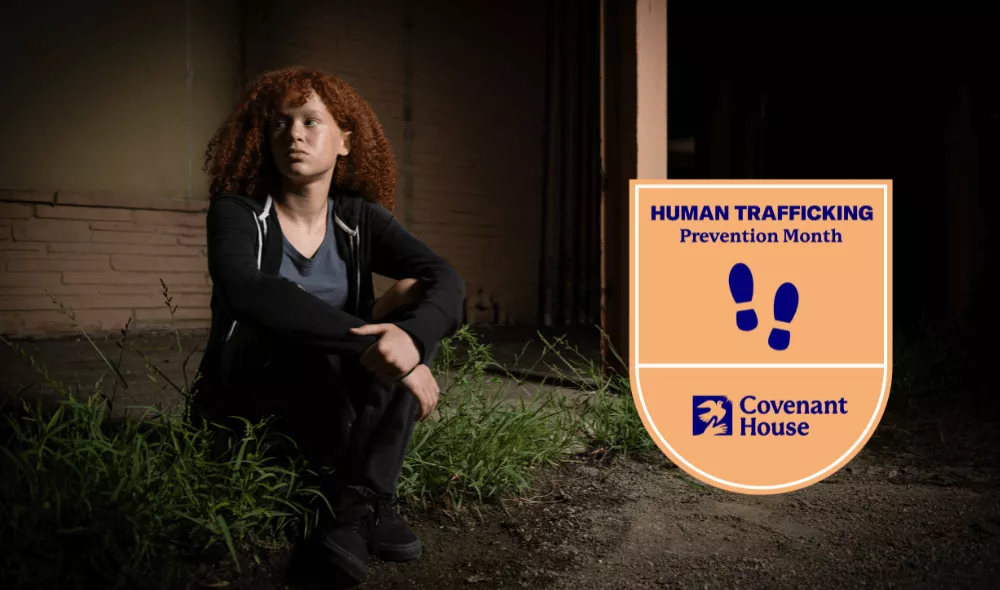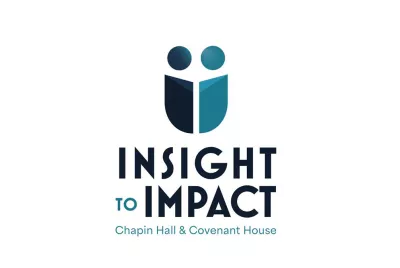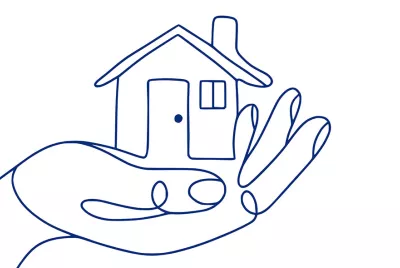Human Trafficking Prevention Month

January is Human Trafficking Prevention Month across the United States, a time to heighten both awareness and prevention of human trafficking and enslavement. At Covenant House we are advancing our capacity to support trafficking survivors, and we invite you to join us in our ongoing efforts to put an end to human trafficking in all its forms.
Human trafficking is an abhorrent system by which people are deprived of their freedom, and forced into labor, sex work, and more, for which they are paid little or nothing. It’s the use of force, fraud, or coercion to compel a person into commercial sex acts or labor or services against their will.
In our long experience helping more than 1.5 million vulnerable children and youth in North and Central America, Covenant House has identified a direct correlation between youth homelessness and becoming a victim of human trafficking. Despite anti-trafficking laws enacted in the United States and most Latin American countries, not enough progress has been made to prevent and prosecute human trafficking.
Leading Research
Based on our groundbreaking research reported in 2018 from 13 cities together with University of Pennsylvania and Loyola University New Orleans, we found that 1 in 5 youth interviewed in the U.S. and Canada reported being survivors of trafficking, including 27% of LGBTQ+ youth. Our research found that nearly one in four youth interviewed were offered money for sex on their first night being homeless.
Covenant House New Jersey, in partnership with Mount Sinai, explored the risk and protection factors for human trafficking among their youth. The study found that young people facing homelessness who have a supportive adult in their lives had lower odds of being trafficked.
Most recently, Covenant House Toronto surveyed teenage girls to better understand the behaviors that put teens at risk for sex trafficking. They found that the early teenage years are a critical time to educate girls on the issue, along with open dialogue with their parents, including internet safety, reduces the risk of being trafficked.
Economic factors made the vast majority of youth most vulnerable to traffickers and unwanted engagement in the sex trade. Of the youth we surveyed, 68% of those who had either been trafficked or engaged in survival sex or commercial sex had done so while homeless. Ninety-one percent of young people we surveyed were approached by strangers or acquaintances who offered fraudulent job opportunities. Of all the youth interviewed, 19% had engaged in survival sex solely so that they could access housing or food.
Honing Tools that Help
Over the past year, Covenant House expanded the deployment of a human trafficking screening tool, the significance of which cannot be overstated. Many of our residents are reluctant to reveal their trafficking histories, but the screening tool allows us to detect those histories and provide much sooner the specific support youth who’ve experienced trafficking need in order to regain control and direction of their lives.
We screened 2,600 youth using our new assessment tool last year. And we’ve now screened more than 80% of all young people served in our residential programs at some point during their stay with us.
We’ve also deepened our training across most of our affiliates. Seventeen of our 18 affiliate sites have received training in the use of the new screening tool. The training covers the legal definition of trafficking, the importance of screening, and how to incorporate the tool into intake and assessment protocols.
Legislative Advocacy
One of the most important partners we have in the U.S. for preventing and ending human trafficking is the federal government. In the last Congress, Covenant House was a leader in advocating for the reauthorization of the Trafficking Victims Protection Act to meet the needs of trafficking survivors and see federal policy take a survivor-informed approach.
Passed at the end of 2022, the bipartisan bills — Abolish Human Trafficking Act and Trafficking Victims Protection Reauthorization Act — reauthorizes and updates the Trafficking Victims Protection Act through 2027. Among new initiatives, the law establishes a pilot program where underserved communities in the United States may apply for funding to develop and implement treatment models and support services for youth at high risk of being trafficked.
In the 119th Congress, Covenant House will continue to advocate for policies to combat human trafficking such as support for shelters, mental health care, education, life skills, and job training.
Also, important for the Covenant House network, we support the authorization of $35 million for housing assistance grants for survivors and the creation of a prevention research agenda that includes research to support effective screening tools, among other research, and require the input of local practitioners.
Covenant House opposes any policy responses that further stigmatize survivors or youth of color. We enthusiastically support policy that recognizes the diversity and disparities among youth experiencing homelessness and advances equitable and inclusive policy and practice to prevent and end youth homelessness
Covenant House is on the front lines against human trafficking. We provide care, advocacy, and research to ensure we can best serve young trafficking survivors. At Covenant House, youth find safe refuge while also accessing services and programs to support their healing and growth on their individual pathway to a bright future. Providing direct care fuels groundbreaking research, which allows us to refine our programmatic methods and tools.
If you want to join us in the fight to end youth homelessness and human trafficking, visit: https://www.covenanthouse.org/homeless-issues/human-trafficking
You might also like...
Shelter Is Only the Beginning
From crisis to care: Find out what it's like when a young person enters our doors.


